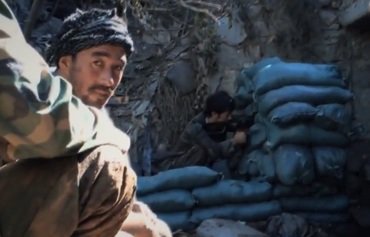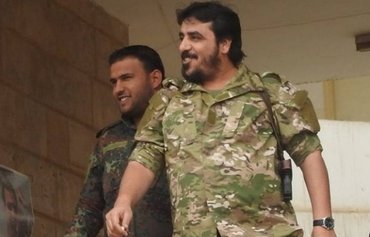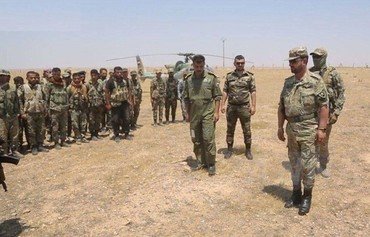After the Syrian army was left with only a fraction of its original capacity with the onset of the war in 2011, several pro-regime militia groups have since surfaced on the battleground in Syria.
While these militias have helped bolster the capacity of the Syrian army, they are not puppets in the hands of the regime and ultimately serve the interests of their sponsors, Iran and Russia, experts say.
Signs of conflict have started to appear among the militias, they said, as they all want a piece of the Syrian cake.
The conflict, the early signs of which started to appear in Deir Ezzor province, is now focused on securing the biggest share of the country's natural resources, including oil, to compensate for losses and costs incurred in recent years.
Shifting loyalties
"The militias, which the regime has been promoting as its supporters and backers, have now been exposed," Syrian journalist Mohammed al-Abdullah told Diyaruna.
"The biggest evidence is what happened in areas under regime control in Deir Ezzor, where differences have started to surface between militias aligned with Iran's Islamic Revolutionary Guard Corps (IRGC) and those backed by Russia," he said.
Militias affiliated with the IRGC have claimed almost full control of the Syrian border town of Albu Kamal, Diyaruna reported June 26th.
Iran-aligned militias have achieved dominance in that part of the province at the expense of Syrian regime forces and Russia-backed militias.
The Syrian regime's influence continues to decline in that area, al-Abdullah said.
"The biggest evidence of the danger of those militias is the shift of loyalty," he said, pointing to Liwa al-Quds, which had switched its allegiance from Iran to Russia, pushing the Iran-aligned militias to expel Liwa militiamen from Albu Kamal.
"It is not just about influence and control, but about wanting the largest slice of the Syrian cake, whether on the political, military or reconstruction levels," he said.
"Both Iran and Russia are trying to get as much of the reconstruction slice as possible to make up for their losses and costs in recent years," he added.
'Areas of multiple influences'
The Syrian army has lost more than 70% of its original capacity since the outbreak of the Syrian revolution in 2011, said Saleh al-Afisi, a Free Syrian Army (FSA) officer in rural Aleppo.
"Since then, reliance has been on the remaining officers and soldiers who are loyal to the regime," he said.
But as the crisis deepened, many groups and militias joined the fight alongside the regime forces, he said. "The start was with the IRGC-aligned militias, and then the Russia-backed militias appeared."
"Despite their apparent support for the regime, these militias have always been keen on implementing the orders of their sponsors," al-Afisi said.
Syria has now turned into "areas of multiple influences which are very difficult for the regime to control", he added.
Several areas are witnessing direct and armed conflicts, especially in Damascus, Aleppo, Daraa and Deir Ezzor, he said.
In addition to clashes between Iran and Russian-backed militias, clashes have also erupted in late June between the Russia-backed 5th Corps and Syrian regime forces in the southern province of Daraa that left nine combatants dead.
As to areas traditionally considered to be regime strongholds, such as Latakia, they are also witnessing conflicts among the regime's various wings over domination and control, al-Afisi said.
The Syrian army is unable to protect the country's borders or have a firm grip on its security, military expert Yahya Mohammed Ali told Diyaruna.
The army's survival "is now always tied to the militias that support it", he said.
"However, the existence of those militias is linked to the political agenda [of their sponsors]," he said, warning that relying on them in any war is a big mistake as they are "mercenaries who are not loyal to their country".
Militias backed by Iran and Russia "may turn against the regime at any time to obey the orders imposed on them," he said.

![Members of the pro-regime Liwa al-Quds militia, which has recently switched its allegiance from Iran to Russia in the area of Deir Ezzor province. [Photo courtesy of Liwa al-Quds]](/cnmi_di/images/2020/07/06/24823-liwa-quds-militia-600_384.jpg)






